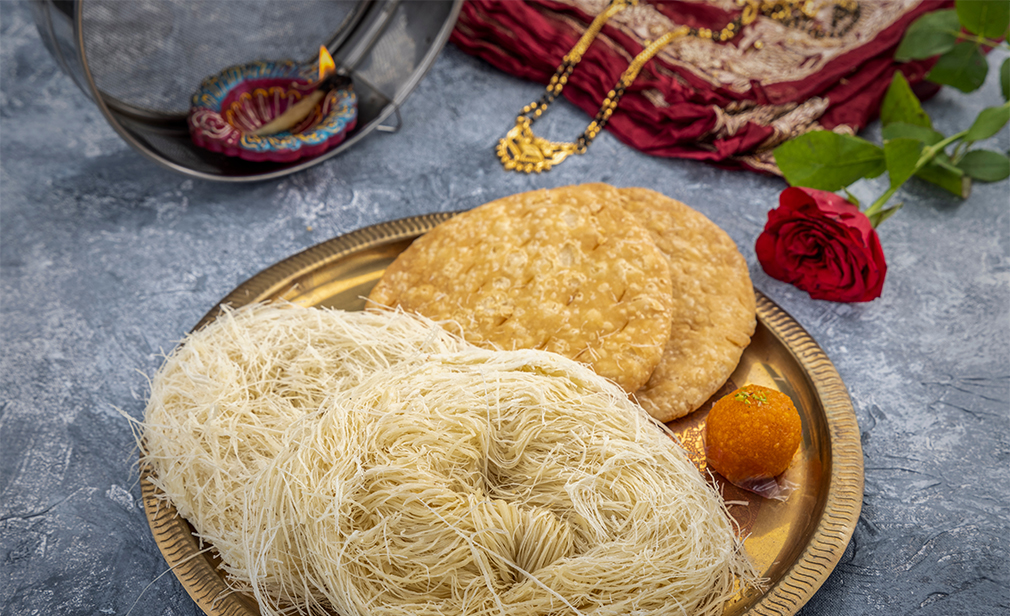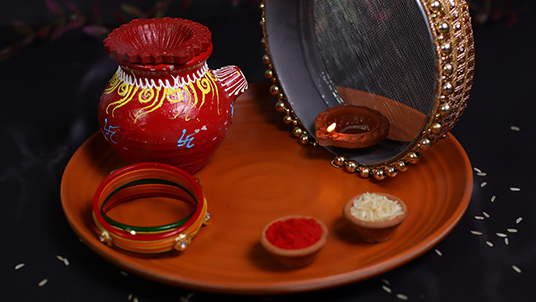An essence of love and marital bonds
Karva Chauth, a blend of devotion and love, encapsulates the essence of Indian marital bonds. The term "Karva Chauth" derives its significance from two words: "Karva," denoting an earthen pot with a spout, and "Chauth," signifying the fourth. The earthen pot plays a vital role in the rituals of this festival as women use it to offer water to the moon, a key part of the ceremony. The festival's true essence lies in strengthening familial bonds and celebrating the sanctity of marriage.
The mythical tales of Karva Chauth
Karva Chauth is woven with enchanting mythological tales. One of the most cherished stories is that of Savitri and Satyavan. In this tale, Savitri's unwavering devotion and determination succeeded in bringing her husband back from the clutches of death. Another intriguing legend tells of Veervati, the sole sister among seven adoring brothers. When her brothers could not bear to see her fasting the entire day, they deceived her into believing that the moon had risen, prompting her to break her fast. Tragically, she soon received news of her husband's demise. Veervati's year-long penance and devotion touched the gods, who granted her husband's return to life.
Karva Chauth in Punjab
In Punjab, a heartland of Karva Chauth celebrations, the festivities commence at the crack of dawn. Married women rise before the sun, adorning themselves in festive attire. On the eve of Karva Chauth, the mother of the married woman sends a Bayaa, a gift consisting of clothing, coconuts, sweets, fruits, and sindoor (vermilion), to her daughter. On Karva Chauth morning, women partake in Sargi, a pre-sunrise meal, which includes a delightful array of fresh fruits, dry fruits, sweets, chapatis, and vegetables.
As the afternoon approaches, women assemble with their thalis, large plates filled with coconuts, fruits, dry fruits, a diya (lamp), a glass of kachi lassi (a milk and water drink), and sweets. These thalis are elegantly covered with cloth. Seated in a circle around the idol of Gaura Maa, a form of Goddess Parvati, elderly women narrate the captivating tale of Karva Chauth and guide the women through the ritual of thali batana. During this ritual, they rotate their thalis seven times while singing devotional songs.
Offerings at moonrise
The climactic moment arrives with the moonrise, where women carry a sieve and a pooja thali, containing a diya made of wheat flour, sweets, and a glass of water, to a vantage point where the moon is visible, typically the terrace. They peer at the moon through the sieve and offer kachi lassi to it. Subsequently, the husband feeds his wife the same kachi lassi and sweets. This beautiful moment signifies the breaking of the fast.
Dinner on Karva Chauth in Punjab typically includes Sabut dal (whole lentils), such as red beans and green pulses, served alongside crispy pooris (fried Indian flatbreads), rice, and delectable sweets from the Bayaa.




























